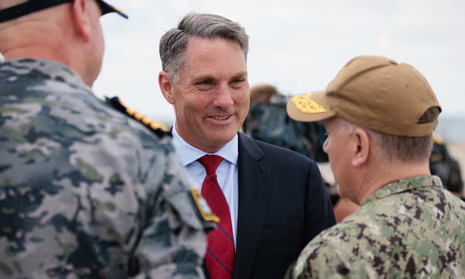Australia has rejected calls to promise military support in a potential conflict over Taiwan, insisting that any decision will rest with the government in power at the time rather than being set in advance. This choice comes as Washington presses allies for clarity on their roles in a possible confrontation with China over the self‑governed island.
US Pressure and Australian Response
In recent months, US defense officials urged Australia to outline its response to a Taiwan contingency, reports show. US Under Secretary of Defense Elbridge Colby met with Australian counterparts to request firm commitments. Yet Australian Defense Industry Minister Pat Conroy replied firmly that Canberra will not pre‑declare its military actions, telling ABC that Australia bases its choices on current threats and priorities, not on hypothetical scenarios.

This stance underscores Australia’s emphasis on sovereign decision‑making. For decades, its leaders have preferred flexibility over rigid pledges in security matters. By resisting preset obligations, Canberra preserves room to evaluate each situation on its merits. In turn, this may help maintain a balanced relationship with both the United States and China.
Regional Tensions and Military Drills
At the same time, Australia has launched its largest joint exercise with the US called the Talisman Sabre exercise. This operation involves some thirty thousand troops from nineteen nations and spans thousands of kilometers across the northern coast of Australia to the Coral Sea. Officials expect the Chinese navy to monitor the maneuvers closely, as it has done in past years.
These drills aim to improve readiness and signal solidarity among partners in the Indo‑Pacific region. However, by refusing to lock in Taiwan commitments, Australia sends a dual message: it will train and cooperate on defense but will also decide on any actual conflict based on real‑time judgments rather than advance promises.
Balancing Alliances and Trade

Australia faces a complex diplomatic balancing act as its largest trading partner, China, continues to expand its military presence in the Pacific. For instance, Beijing’s attempts to establish footholds in regional islands have raised concerns in Canberra about strategic security. Yet at the same time, Chinese demand for Australian exports in minerals and agriculture remains vital.
Therefore, Australia must weigh its alliance obligations against economic interests. By holding back on war pledges, Canberra aims to avoid giving China reasons to impose trade penalties. Meanwhile, it reassures Washington that it remains a reliable partner through joint exercises and defense spending increases.
Implications for Future Policy
Australia’s refusal to pre‑commit forces does not signal retreat from regional security. On the contrary, it stresses that any deployment will come after careful analysis of threats and national interests. Such an approach may encourage other allies to adopt similar caution rather than promise open‑ended support.
Moreover, it may drive the United States to refine its own ambiguity policy and to pursue stronger diplomatic engagement in the region. If key allies resist preset promises, the US may need to invest more in shared decision‑making frameworks and multilateral planning.
Personal Analysis
From my perspective, Australia’s stance reflects a mature strategy for a middle power navigating great‑power rivalry. By avoiding rigid commitments, Canberra preserves strategic autonomy and sends a clear signal that it values thoughtful policy over knee‑jerk declarations.
In doing so, it reduces risks of unintended escalation while still showing it takes regional security seriously. This balance may become a model for other nations seeking both strong alliances and independent foreign policies.
Sources: financialtimes.com

